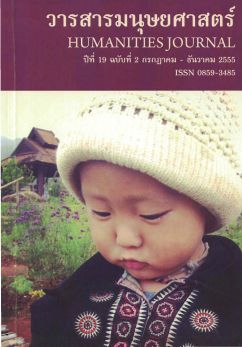การเข้าใจพุทธทำนายเรื่อง "พรหมจรรย์ไม่ตั้งอยู่นาน" กับปัญหาการบวชภิกษุณีในสังคมไทย
Main Article Content
Abstract
ในเบื้องต้นบทความนี้จะแสดงให้เห็นลักษณะและข้อบกพร่องของการนำพุทธทำนายเรื่อง "พรหมจรรย์ไม่ตั้งอยู่นาน" ซึ่งเป็นข้อความที่ปรากฏอยู่ในพระไตรปิฏก มาใช้เป็นข้ออ้างหนึ่งในการถกเถียงปัญหาการบวชภิกษุณีในสังคมไทย ของทั้งฝ่ายที่ไม่เห็นด้วยกับการบวชภิกษุณีซึ่งเชื่อว่าพุทธทำนายนี้เป็นพุทธพจน์แท้ และฝ่ายที่เห็นด้วยกับการบวชภิกษุณีที่พยายามปฏิเสธว่าพุทธทำนายนี้ไม่ใช่พุทธพจน์แท้ ต่อจากนั้นผู้เขียนจะได้เสนอแนวทางการเข้าใจพุทธทำนายดังกล่าวนี้เสียใหม่ ภายใต้การเข้าใจอย่างใหม่นี้ พุทธทำนายจะดำรงอยู่ในฐานะคำเตือน ดังนั้น ถึงแม้ยอมรับว่าข้อความพุทธทำนายนี้เป็นพุทธพจน์แท้ ฝ่ายที่ไม่เห็นด้วยกับการบวชภิกษุณีก็จะไม่สามารถนำพุทธทำนายนี้ไปใช้เป็นข้ออ้างเพื่อไม่ให้มีการบวชภิกษุณีได้อีกต่อไป
Understanding the Buddha’s Prophecy regarding “Brahmacarya will not last long” and the Problem of Bhikkhuni Ordination in Thai Society
Pairin Katipommarat
Initially, this paper aims to expose the faults and weaknesses of the often cited Buddha’s Prophecy “Brahmacarya will not last long”, which appears in the Tipitaka, as one argument against bhikkhuni ordination in Thai society. Basically, there are two groups-the pro-bhikkhuni group and the anti-bhikkhuni group. The anti-bhikkhuni group does not agree with the ordination of bhikkhunis and claims the prophecy to be genuine. The opposing group, the
pro-bhikkhuni group, supports the ordination of bhikkhunis and claims the prophecy to be ungenuine. Moreover, I propose a new understanding of this contested passage. With this new view, the Buddha’s word will be understood as a warning. Therefore, even though the prophecy is genuine it can no longer be used by the anti-bhikkhuni group in their argument against bhikkhuni ordination.


